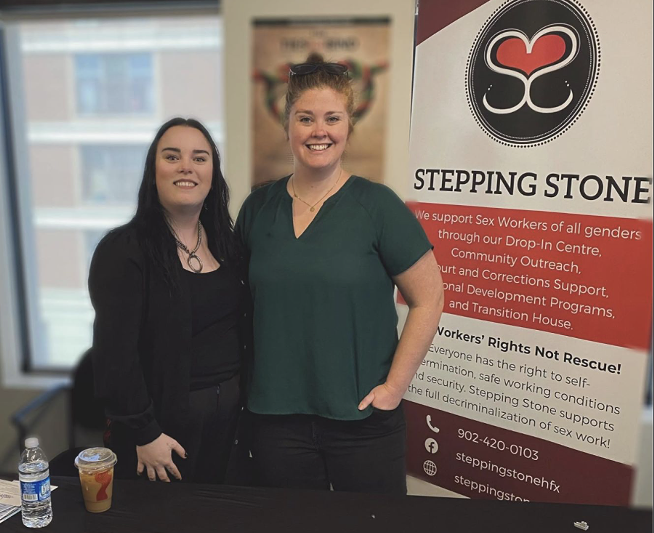Alex MacDonnell had no idea that a routine outreach visit to a correctional facility would lay the foundation for where she is today—in the most literal way possible.
At the time, she was the executive director of the Hepatitis Outreach Society, where she did a lot of resource fairs in the Nova Institute for Women—one of six federal correctional facilities for women across Canada. On one visit, she met an offender named Sarah who she began a relationship with that would span the entirety of Sarah’s eight-year sentence.
When Sarah got out of prison, she was able to completely change the trajectory of her life and eventually began working at Northpine Foundation based in Toronto—an organization that lends financial support and expertise to explore unmet opportunities for underserved communities in Canada.
Which brings us to where we’re sitting today; in MacDonnell’s office in the new Stepping Stone facility on Primrose Street in Dartmouth where she is now the executive director. It’s a step up (pun intended) for the organization that supports both current and former sex workers.
The building itself is long and narrow, with new looking linoleum and a hint of that fresh paint smell. It’s two hallways stacked directly on top of each other.
Downstairs, there are several rooms jam packed with things like safe drug gear, toiletries, condoms, and food that gets handed out when outreach teams do their walks. There is also a room full of donated clothing, as well as a room where clients can have access to the internet. And by the front door, there is a kitchen area, a place to do laundry or take a shower, and a small living area.
Upstairs, there are staff and counselling offices, a group therapy room complete with art supplies and four small residential units. The facility offers an incredible amount of services per square footage.
Oh, and the down payment for the new digs? That came from none other than Northpine Foundation, spear-headed by Sarah—the one-time convict who MacDonnell supported so many years ago.
“This facility was kind of the final piece of the puzzle because we’re now able to have everything under one roof,” says MacDonnell. “We have everything we need to meet them wherever they are, whether on the streets, if they drop in here for food and now we can offer housing on site as well.”
Coming alive
Stepping Stone’s new location is in the middle of the hub where a lot of clients live and work, so word-of-mouth has brought in a significant increase in new clientele. MacDonnell says they see about three new clients a week and the outreach team is seeing about 40 people per shift.
“The outreach teams go out Monday, Wednesday and Friday nights and deliver food, personal hygiene products, condoms and the bad date list, which is a resource developed by sex workers for sex workers,” says MacDonnell. “If somebody has a bad date, they can give us as much information as possible—like the car details and a description of the person— and we’ll put it in a document and give it to other sex workers to try and warn them to stay away from that individual.”
The aim of the game is always harm reduction; it’s the through line of all of the services provided by Stepping Stone. Clients are asked not to use or drink in the building, but are allowed to arrive under the influence without repercussion. They are not encouraged to transition out of sex work, unless that’s their goal. They are not encouraged to get clean, unless that’s their goal. It’s about meeting them exactly where they are on their journey, without agenda or judgment.

There is, however, certain criteria that a client must meet in order to become a resident of Stepping Stone. They have to either be homeless or in an abusive situation. Unfortunately, that criteria applies to about 50% of their 300 plus clients, making a huge pool of people that qualify and only four onsite rooms available.
“We have a waitlist and I could fill so many beds. And it’s up to us to decide who gets to live here and that’s really, really hard because what gives us the right to decide someone’s future like that?” says MacDonnell. “You’re basically putting someone’s life in your hands with the decisions that you’re making.”
During their stay, case workers and staff will help them with their most basic, bare minimum needs to start—like getting a government ID or a bus pass or applying for income assistance. But they will also work with them to achieve whatever larger goals they set for themselves—like getting sober, repairing relationships or exploring education opportunities.
“A lot of people when they arrive, they can’t even really see past today. They just need a bed to rest in,” says MacDonnell. “But after a couple of months, they sort of come alive and start setting goals for themselves. It’s amazing what happens when people move out of survival mode.”
Transitioning
In a perfect world, the residents would stay for nine months before they would transition into a more long-term, affordable living situation. Unfortunately, the world is far from perfect and the housing situation is particularly dire in Halifax.
“We won’t kick them out if they have no place to go, so we have some who have stayed for up to 12 months because it’s not their fault that we don’t have a place to put them,” says MacDonnell.
And there it is: the crux of the problem. As a society, we can have all of the services and support programs in the world—incidentally, the homelessness business is “booming” with employment opportunities because the need is so high—but what happens when people are ready to transition into permanent housing?
That’s the question that Ren Dobbin is trying to answer. She is the transition house manager at Stepping Stone and sees first hand the difficulty finding suitable living arrangements for sex workers.
“The first thing we help them with when they get here is completing the paperwork to get on the By Name List (BNL) and the Vulnerability Index – Service Prioritization Decision Assistance Tool (VI-SPDAT)—two documents that exist to keep tabs on folks that identify as homeless,” explains Dobbin.
Being on the BNL identifies you as someone that is experiencing chronic homelessness that is in need of access to services and community, and the VI-SPDAT is a series of questions that gives you a number—or score—that determines your acuity, your need and your risk. A person is determined higher risk if they engage in things like active drug use or sex work.
Completing two documents sounds simple enough, but a lot of people don’t have access to the internet, the paperwork and somebody that knows how to complete the paperwork. It’s a huge barrier to entry into the system, but something clients of Stepping Stone work with support staff to complete.
Stoking the fire
With so many people needing a place to stay and so few beds available, it becomes almost a lottery to get one. “We’ll be at a roundtable meeting with all of the community groups and a housing organization—like Out of the Cold or The Overlook— will say, ok, we need one name. Of all of your organizations, we want one name,” says Dobbin.

To add to the problem, even if housing were available and suitable to meet the needs of the client, they simply aren’t affordable anymore.
“Several years ago, I worked as an outreach and aftercare coordinator and I would place people in this exact community—Pinecrest, Jackson—and the rent would be between $500 and $700 a month, so housing people was never an issue,” says Dobbin. “Now, that same place is $1,700 a month, so the private rental market has become completely inaccessible and unavailable to the people we support.”
A lot of people get turned down too if they are on income assistance or if the landlord finds out that they’re working with a community organization. Communication from a third-party is often seen as an immediate red flag, and so the private rental market is a firmly closed door at this time.
“All we can do is make connections with other community organizations and keep our eyes and ears open for anytime a bed becomes available. And then when that bed’s available, you hope they think of you,” says Dobbin. “We really have to fight for our clients and, I wouldn’t say do questionable things, but definitely stretch ourselves to light that fire and keep stoking that advocacy fire for the person.”
Lingering over everything too is the limited funding available to Stepping Stone and what the money can actually be used for. The Department of Community Services, for example, gives funding for housing, which is great, but that’s literally it. There is no extra money to help with everyday incidentals, like transportation, to help clients get to and from meetings or appointments.
“Expanding on the services that we’re able to provide here would be wonderful and with more funding we could give more integral support,” says Dobbin. “I think the biggest problem is that homelessness in the province is a federal issue, but it’s being treated like it’s an issue of the community. We have non-profits trying to step in and pick up the pieces, but there’s only so much we can do.”
The red umbrella
A lot of the issues facing Stepping Stone’s clients could be eradicated with the decriminalization of sex work and so advocating for that is always at the forefront of their mission. And let’s be real, sex work is not going anywhere—they don’t call it the world’s oldest profession for nothing. And that being the case, decriminalization would help to both reduce the stigma around, and improve the safety of, sex work.
“Decriminalization is just the start. It’s not going to solve the human trafficking problem, but it would go a long way in helping people to come up with a safety plan instead of hiding,” says MacDonnell. “Having these kinds of conversations and putting a face to the profession is so important.”
Not to mention, it would be nice for sex workers to have a T4 or be eligible for things like the Canadian Emergency Response Benefit should another disaster like Covid strike—both of which you need to be able to safely report working wages and hours to obtain.
As MacDonnell walks me out of the facility, we pass a huge mural painted on the wall of the main hallway. It’s of a giant red umbrella, sitting on the sand at a beautiful beach, the blue water has perfect little white peaks of waves. You can almost smell the salt and suntan lotion.

The red umbrella became a symbol of sex work in 2001 during the 49th Venice Biennale of Art when sex workers demonstrated against inhumane work conditions and human rights violations by holding up red umbrellas, making this a symbol of resistance to discrimination.
Seeing it on a beach setting like this makes me think of vacation; of peace, rest and freedom. Things that each and every one of us deserve to have, regardless of what we do for a living,















